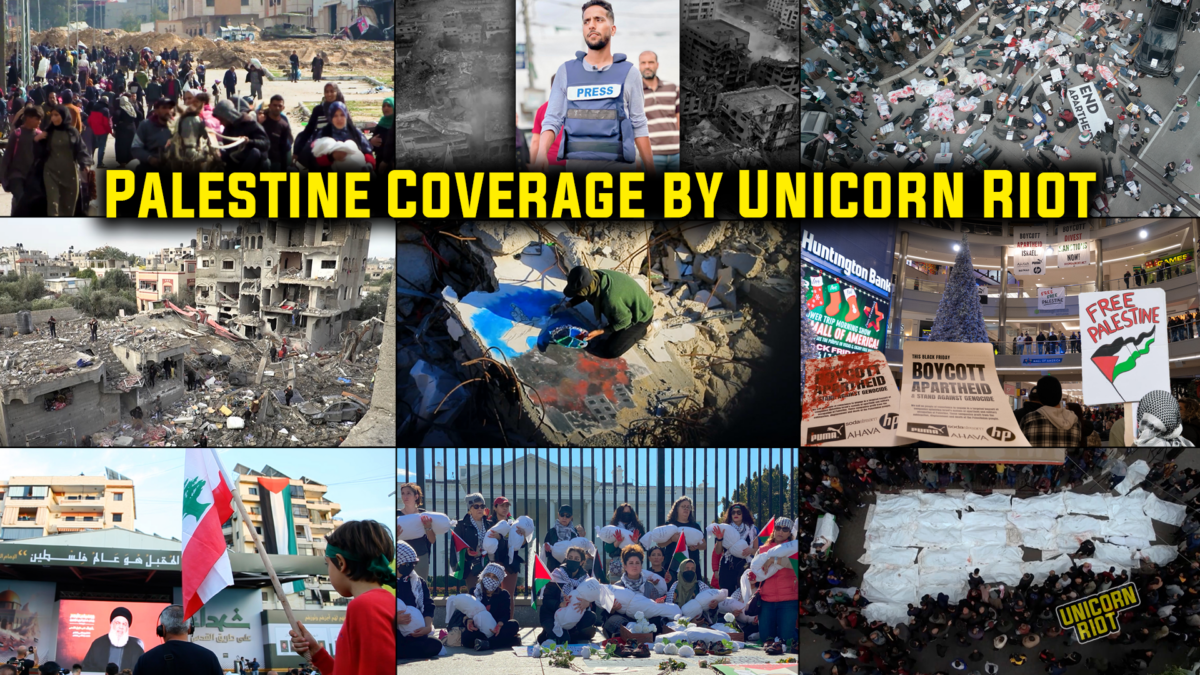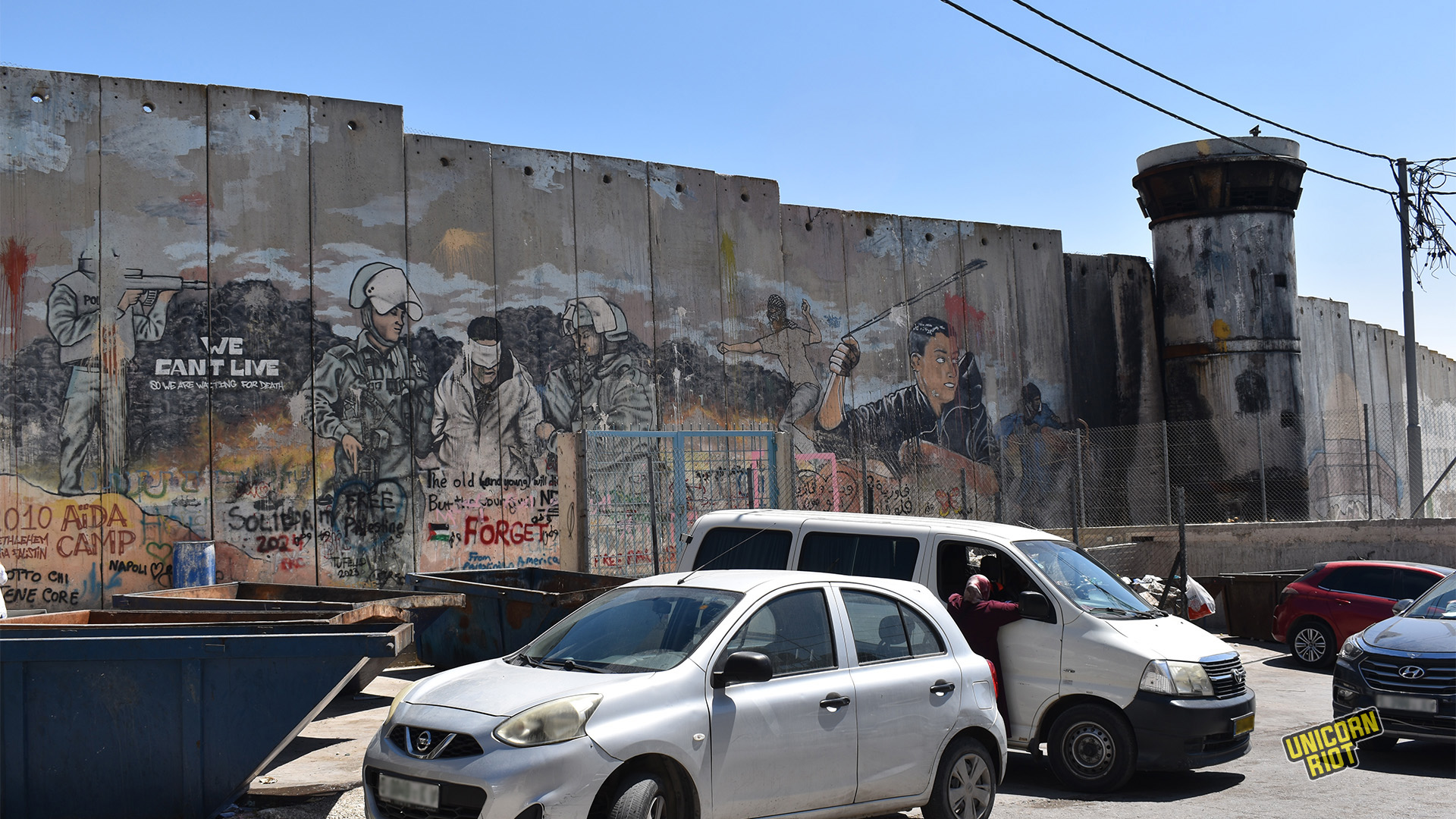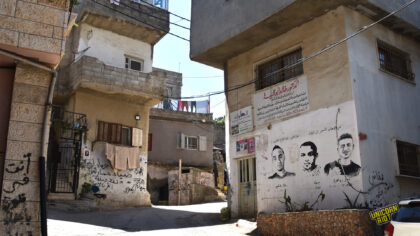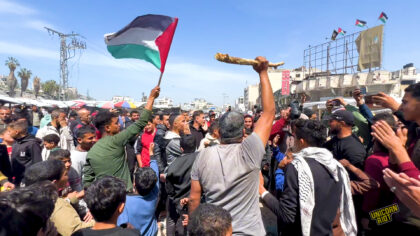A People on the Brink: Life and Death in Dheisheh Camp – PT. 2
The following is part 2 of our article series documenting conditions at Dheisheh refugee camp in the occupied Palestinian West Bank, where independent journalist and Unicorn Riot contributor Brendan Dunn, spent time in 2023 and 2024 collecting stories from Palestinian activists resisting the ongoing Israeli occupation. Click here to view part 1.
The Raid
A life filled with injustices, pain and sorrow has not broken Naji Owda’s spirit, or his commitment to liberate his homeland. But there are times he becomes introspective, withdrawn. Life has been much more difficult in Dheisheh since the October 7, 2023 Hamas attacks. The occupation feels more odious and severe than it had in the past.
One morning, Owda drives through the camp to visit his sister to check in on her. Raids in the camp became more frequent and more intense since Israelis initiated the genocide in Gaza, he says. Owda’s extended family also continues to be a regular target of the Israeli army.
Owda and his sister, her eyes full of anguish, embrace when he meets her at her house which sits perched on a hill in the camp. Her home was raided dozens of times by the army in search of her sons who were targeted for their political activism in the PFLP. Months after a harrowing series of raids she refuses to touch anything in her home destroyed by the army. Several rooms in her house hold piles of broken furniture; the floors are covered in shards of shattered glass.
Plaques commemorating another son, Motaz, who was killed by the army in 2015, stand in the corner, smashed into pieces and spray painted by Israeli soldiers.
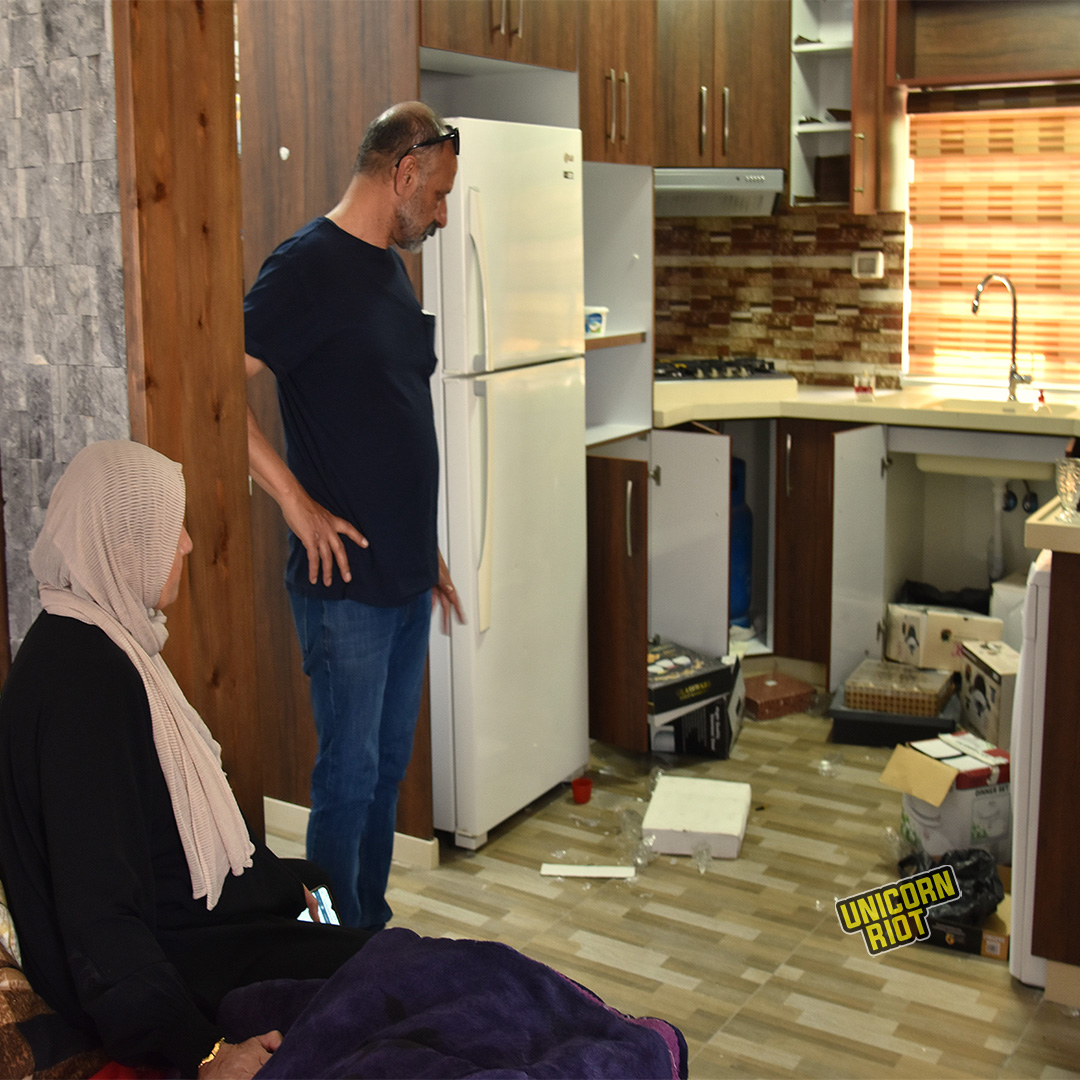
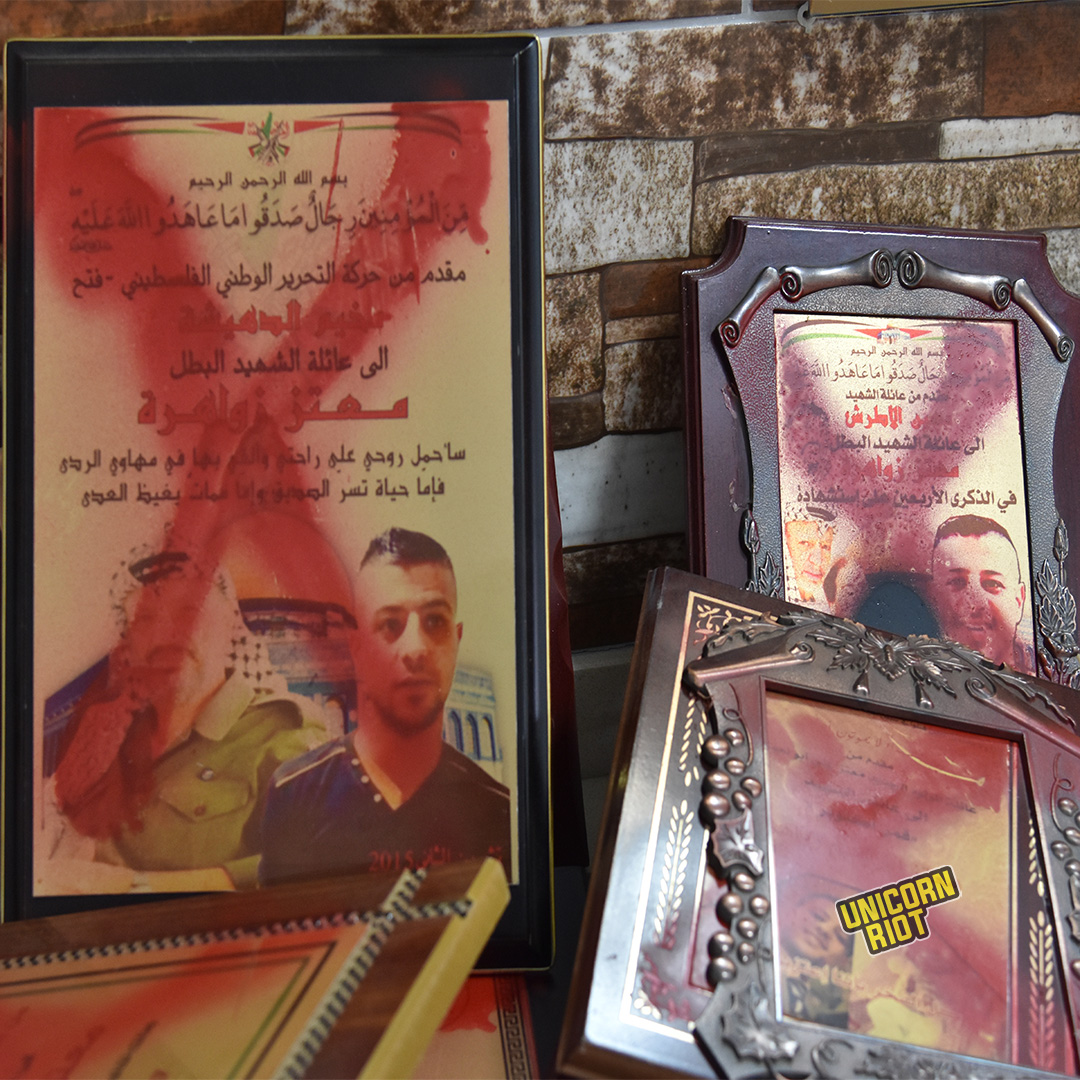
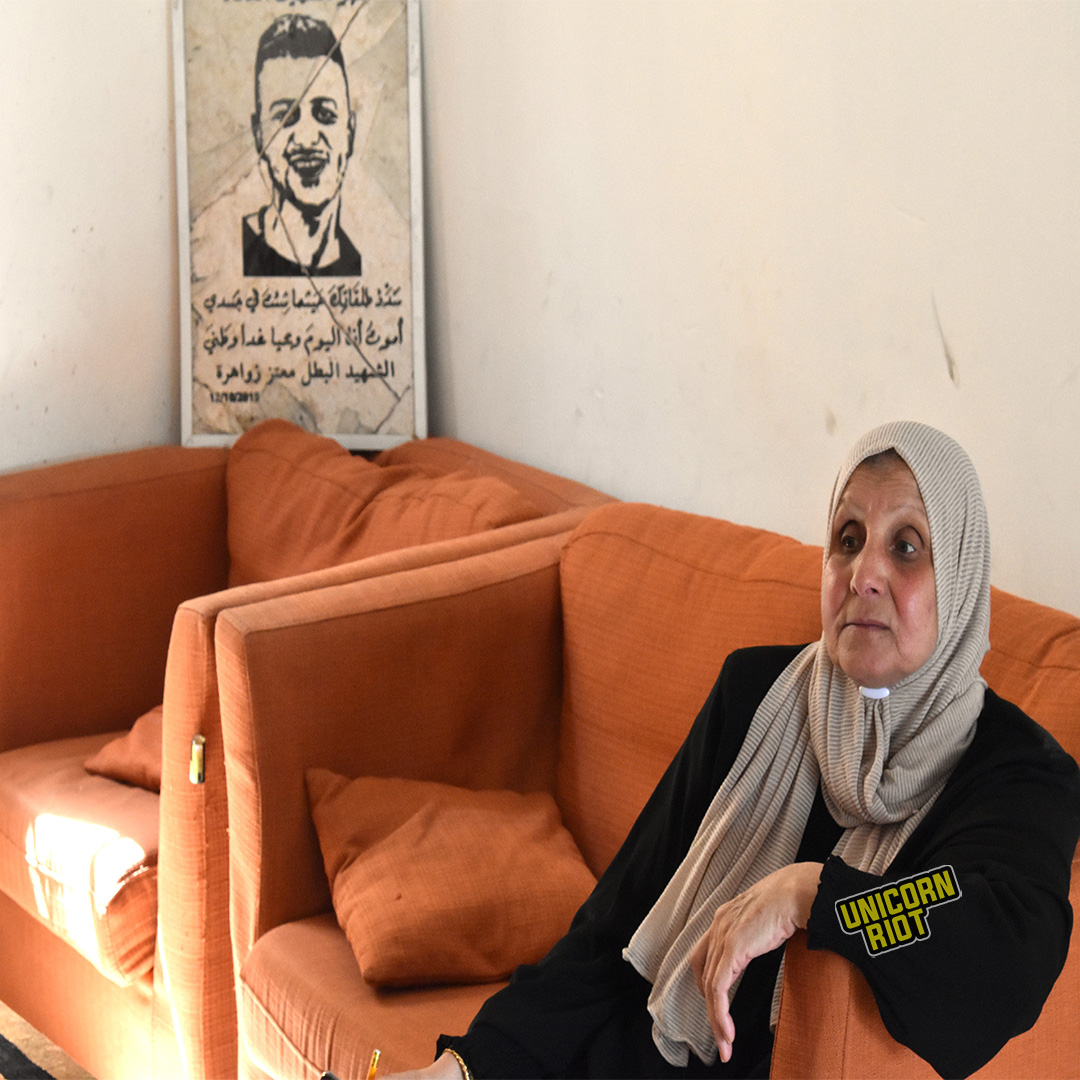
As they walk into the main room, his sister Najia Ahmad Owda Zawarha receives a text. “My one son in prison was just told that my other son in prison was killed,” she says. It was a false rumor started by the Israelis. But with no access to attorneys and little contact with the outside world, her son would have to sit with that shocking news in solitude.
The Israeli army routinely carries out collective punishment of entire extended families of people they target for arrest or assassination. Owda’s nephew Ghassan Zawarha is currently 42 and has spent 17 years in Israeli prisons.
Naji Owda and his sister described in detail how the Israeli army threatened, attacked, and arrested relatives with regularity in order to pressure Owda’s nephews to turn themselves in.
In the early morning of December 4, 2023, Owda’s house was raided by over 30 Israeli soldiers. His daughter Moony Owda, 30, who works as a social worker, recounts what she says was a terrifying situation. She is still traumatized from a 2002 army raid on her home where Israeli soldiers severely beat her father and brother. She shares the house with her parents, her brother and his wife, and their two children. Everyone was woken up by gunpoint, recounts Moony Owda.
“They just opened my room, and they put their guns, 5 of them, in my head,” she recalls of the Israeli soldiers. “I freaked out. I jumped out of the bed. I was so scared. I felt so cold. I didn’t feel my heart. I couldn’t even walk because I was shaking. I needed someone to just hold my hand so I could walk.”
Past attacks from the army were heavy on Moony Owda’s mind that night. During past incursions into Dheisheh, the army sent soldiers on patrol, trucks, and helicopters. “You would see snipers everywhere. And that was the most scary thing because especially when they come at night, they will put snipers everywhere and we need to be careful.”
One soldier took her aside for questioning. “This was a nightmare. I had to go with him to the second floor with ten soldiers. Everyone just surrounded me and their guns were in my head and my back. So I went up. They took me hostage.”
Moony Owda said that after the raid on her home, that “it’s a nightmare for us every day. We stopped sleeping. We’re not just scared about our family. We have the people that we know, our neighbors, our friends, everyone in the camp we’re scared for.” “[Israeli soldiers] will come in the house. They steal everything. They will kill you without even thinking, without even asking, or if you did anything or you did nothing.”
The soldiers were looking for her cousins, but nobody in the family could tell where they were. Moony Owda says that her father Naji Owda and her brother were taken away by the soldiers. They were blindfolded, handcuffed, then tossed in an army vehicle. According to Moony Owda, the soldiers were informed that her brother was an American citizen, but they relished in beating him in the van, invoking his US citizenship to taunt him.
When they reached their destination, Owda was hauled in front of an officer, who went by the name of Shaker. Owda recalls the officer looking at him and telling him, “I brought you here because I want to send a message to your nephew. If he doesn’t come, you will pay the price.”
When Naji Owda recounts what happened to him, he begins to speak very slowly. His eyes glaze over. He says the officer threatened his family by telling him, “We are the occupation and we are allowed to do exactly this. I can kill you. I can do anything.” Owda told him he had no idea where his nephew was, and was then told that “all of the family [will] have to pay the price.”
The entire time during Owda’s detention, he was terrified over where his son was. Four days into his detention he was abruptly blindfolded, tossed into an army vehicle, and dropped off on the side of the road halfway between Bethlehem and Hebron. He was covered in dried blood, and one arm hung limp, dislocated from beatings by the soldiers during his detention.
He knew from experience not to tell soldiers of the injury because the soldiers would “Keep beating you in the same place. Now for that I keep silent.”
He found a coffee vendor on the street and called his wife. He was relieved to hear that his son was already released and safe at home. His nephews were still in hiding however, and in the coming weeks the Israeli army continued to visit or raid relatives’ homes.
Someone from the Palestinian Authority (PA) reached out to Owda and passed on a message from the Israelis about his nephews. “When they see him, they will not catch him. They will shoot him immediately and this is an order,” Owda recalled being told.
Owda recounted the sleepless nights for everyone. His sister and her husband’s health declined. Every night, relatives were kept awake in fear. “Maybe this time they will come,” Owda recalled thinking about the army. “Now, if they didn’t come, you keep worrying and count how many hours when they will come and what they will do, what we will do.”
When Naji Owda’s nephews learned of the army’s constant attacks on their extended family they decided to turn themselves in. One was sent to an Israeli prison and the other sent to a PA prison.. The raids picked up again in the past month to pressure the family to tell the PA to transfer Ghassan Zawarha to Israeli control.
The army intensified their attacks on the family in February. “Over 50 soldiers came to the house several times a day every day, and destroyed the house completely. They said, ‘we will make this house unlivable,’” recounts Moony. She says that the army threatened to kill the whole family. Ghassan Zawarha heard about the escalation in violent attacks, and agreed to be transferred to an Israeli prison. Then tragedy struck. His father Abu Ghassan, already fighting cancer and a heart condition, succumbed to the stress from the raids. He died from a heart attack on February 22, 2025. The raids have not subsided.
On April 2, the IDF sent 30 jeeps and army vehicles in a 7 hour long raid on the camp. Saed recounts that soldiers “destroyed two cars, and they destroyed everything in every house they entered,” adding that soldiers also stole money from residents, spray painted nationalist graffiti on homes, and physically beat residents. Moony Owda says that the soldiers confiscated phones from some residents and delivered a threat on camp-wide group chats for refugees in the camp to “Be careful. We are coming for you.”
Constant violent attacks from the army, prison, and death are the tragic norms of Palestinian society. It seems more of a question not if they will be arrested, but when. For Owda’s nephews, the pressing question is when, or if, they will ever be released.
The Injured
Late at night, Moony Owda and her friend Sa’ed Abu Hadros share their story of how they met. The two found each other through a program at Laylac for injured people in Dheisheh camp. Moony Owda launched the program while she was working on her master’s degree in social work at Bethlehem University.
Moony Owda explains that Hadros was adrift, depressed, and hopeless before joining the program. He survived an attack on the camp of over 100 soldiers in September 2022. He was shot by a soldier amidst the chaos of young people fighting back and throwing rocks at the soldiers and their vehicles. “I passed out for 10 minutes. Before I passed out, all of my body was numb. I couldn’t feel anything,” he says.
Hadros says he was rushed to a hospital that is chronically ill equipped and understaffed, where he waited in agonizing pain for hours before he was brought to another hospital for an operation. “The situation was very complicated and difficult because I waited so long, and I lost a lot of blood. And when the doctor came and finished with the operation, he told me, ‘you’re so lucky that you’re alive.’”
The damage was extensive. He was shot with a ‘dumdum’ bullet which is designed to expand on impact. The surgeon found 30 shards of the bullet spread throughout his leg, and wasn’t able to remove everything.
Moony Owda says that Israeli soldiers will often shoot to maim, rather than to kill. She says that this comes from directives from Israeli army Captain Nidal.
A report published by the organization BADIL Resource Center for Palestinian Residency and Refugee Rights chronicles multiple cases in Dheisheh of IDF soldiers shooting to injure youth. Children who were detained by the IDF recount threats from Nidal who witnesses claim told them, “I will make half of you disabled, and let the other half push the wheelchairs.” A doctor quoted in the report states that the IDF practice of “kneecapping” (intentionally shooting children in the knees) is both “systematic and intentional.”
Recovery was excruciating. Months were spent resting in bed, then in a wheelchair. He eventually found the strength to walk, but always with the assistance of two canes. He spoke softly, and slowly about an army raid on his house while he was still in recovery. Israeli soldiers were looking for his brother. He recalls a soldier who recognized him and said, “’ We shot you before.’” Despite his pleas, they refused to let him walk with his canes, and detained him for two hours before releasing him. His two brothers were also arrested and kept in administrative detention.
Sa’ed Abu Hadros’s depression only deepened. His brothers were in prison, and he had to deal with an occupation army that might target him again, knowing full well he was unable to run away from them. He was ready to seek help for his situation, but he felt that the NGO-dominant groups were more enamored with the optics of helping injured people to please foreign donors. When he heard about Laylac’s program, he joined without a second thought.
Through open discussions and writing workshops facilitated by Moony Owda, Hadros opened up for the first time since getting shot by the army, a time in his life defined by fear. “I lost hope before being in this group. I didn’t have any hope or anything,” he says.
Moony Owda gently nods her head in agreement. “He told me several times, ‘Moony… I think it’s better for me to die.’ That just broke my heart. Because, he’s young. He’s only 20,” she says.
The workshops gave him hope for the first time. He gained more confidence. “Moony played a big role in my life because I started to walk. I stopped using the canes, and now I’m walking,” he says with a smile on his face.
He shares a video of the first time he walked without the use of canes – his family was elated and threw a celebration. As Sa’ed Abu Hadros talks about the positive transformation in his life, both he and Moony Owda are overcome with emotion. Even in the depths and despair of occupation, and genocide, Palestinians still find moments to reclaim their humanity, to cry, and to dream of a better future.
The Future
For many residents of Dheisheh camp, the prospect of Palestinian liberation has never seemed so close yet so far away at the same time. People in the camp talk excitedly about pro-Palestine protests held in the US and elsewhere. The scale of international support and mass protests for a free Palestine and against the genocide and occupation are in many ways unprecedented.
At the same time, Palestinians, especially in places like Dheisheh, have experienced increased army raids, an uptick in settler violence around the camp, and the largest illegal land grabs surrounding Bethlehem in recent memory. All of this is emboldened and enabled by the most right-wing government in Israeli history. Camp residents feel even more caged in by what they say is an even more deeply entrenched occupation than in the past. Raids are more frequent and “flying military checkpoints” that temporarily pop up in and around Bethlehem are now common.
The Israeli system of mass surveillance is ubiquitous. Young residents in the camp say that posting anything on social media critical of Israel or demanding an end to the war and genocide could result in a raid by the army, and up to a year in prison. Protests are few and far between. Even wearing a keffiyeh in public “could get you shot by the army,” says one Laylac volunteer.
As the genocide continues in Gaza after a brief pause, IDF operations have also intensified across the rest of Palestine. The most bellicose and far-right of Israeli politicians speak brazenly now about their desire to annex the West Bank. Israeli zealots also have their eyes on establishing illegal settlements in Gaza and Syria. And now as the genocide in Gaza continues, and captives between Hamas and Israel are being exchanged, the Israeli army has intensified operations across the West Bank.
Talk in Dheisheh Camp lately is laden with peoples’ fear of ethnic cleansing – the forced annexation of their camp. “We are scared of what’s going on in Jenin, Nablus, Tulkarm, scared for us, for our family, our house,” says Moony Owda, adding that the Israeli army enters the camp daily and soldiers take pictures of all the streets and houses. Moony Owda says that she and many others in the camp are convinced that the IDF is planning to empty the camp of its residents. Like Jenin camp, Dheisheh has long been a hotbed of resistance against the occupation.
“Where will we go if we have to leave our house? There is nowhere to go,” says Owda.
On many of the walls in the camp are paintings of Handala, a nationally cherished symbol of Palestinian identity and resistance which was created by cartoonist Naji al-Ali in 1969. Handala is a Palestinian child – dirty, wearing ragged clothes, and barefoot. His hands are clasped behind his back as he waits patiently for a liberated Palestine. He’s determined to fight for justice and freedom on his own terms. The current situation and future seem bleak, perhaps even more so than in 1969. But for many of the youth at Laylac, freedom for Palestinians seems not only possible, but probable – “in our lifetimes” they say. They too are waiting yet determined, just like Handala.
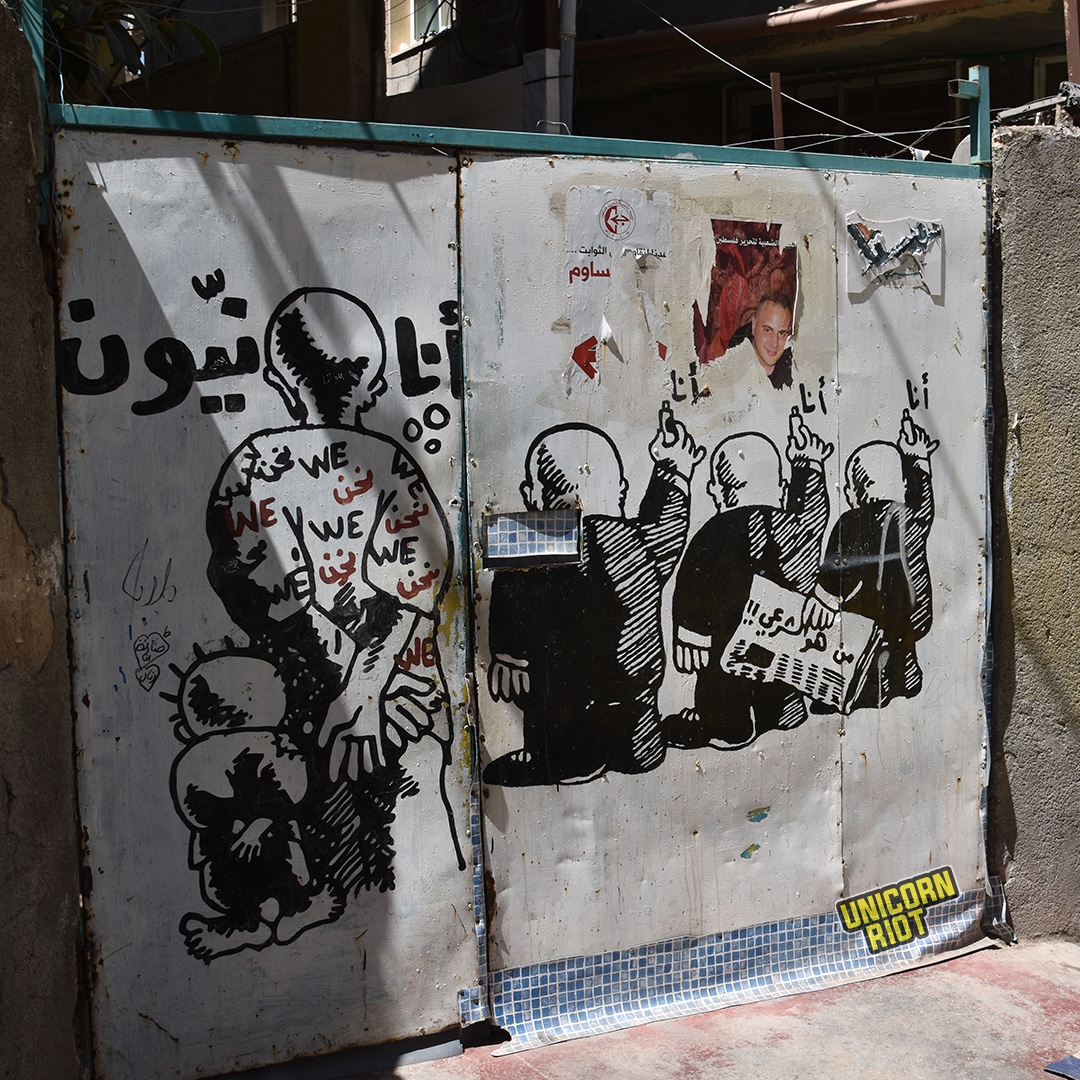
Hours after the sun sets over the Bethlehem hills, Naji Owda pays a visit to an old friend of his – “a journalist, an old Communist.” The two embrace each other and immediately dive into conversation. They talk about Jesus as a revolutionary, the genocide in Gaza, the betrayal of Oslo, the time they spent in prison. Dheisheh, the old friend says, “is the greatest place on earth.” The community and solidarity is palpable. The camp has yet to be beaten into submission by the Israelis. They talk late into the night, one cup of peppermint tea at a time, one cigarette after the other.
It’s time for Naji Owda to leave. The friends embrace each other, and Owda slowly walks the streets and alleys back home. Every person he passes greets the respected activist, smiles are exchanged. A young boy selling food on the street excitedly runs up to Owda and talks about Laylac. “Our youngest volunteer,” exclaims Owda. The boy runs off into the night. Naji Owda, a man among the people, a man who refuses to be killed, a man in a camp that is always on the brink, walks off into a myriad of shadow and light. Tomorrow is a new day, and one more day, the people of Dheisheh hope, closer to freedom.
